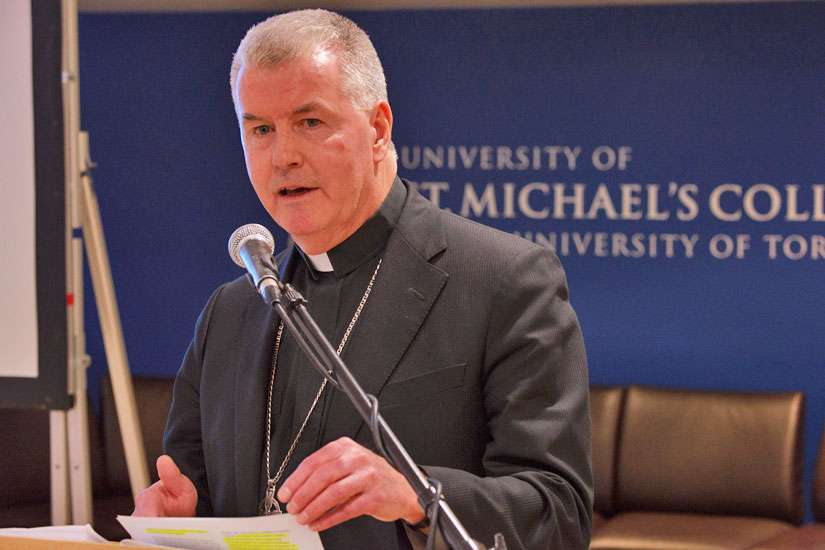“We are trying roads of advocacy,” Peterborough’s Bishop William McGrattan told an audience of more than 100 at the University of St. Michael’s College March 30. “Elected officials are reaching out to me. I take that as a good sign.”
McGrattan represents Canada’s bishops on the governing council of the Catholic Health Alliance of Canada, the national lobbying organization for Catholic hospitals, nursing homes, hospices and other health institutions. The bishop and moral theologian teamed up with Euthanasia Prevention Coalition executive director Alex Schadenberg to outline the Catholic position on physician-assisted death legislation which the Supreme Court of Canada says must pass by June 6.
“It can’t take place in a Catholic facility,” said McGrattan.
But McGrattan is realistic about opposition to the Catholic position.
“I would guarantee you that there will be a test case,” he said.
The Catholic Health Alliance and the Canadian Conference of Catholic Bishops are lobbying hard to have the government recognize the conscience rights of individual doctors and of Catholic and other religious health care institutions. That right includes the right not to directly refer a patient to another doctor or hospital for the sole purpose of administering a lethal dose.
Given the delicate, frail state of many patients who will request assisted suicide, it seems likely that sooner or later a patient will be deemed too frail to move from their Catholic nursing home to one willing to administer medical death. Such a scenario has the makings of a legal challenge to Catholic conscience rights, assuming the federal government can be persuaded to enshrine conscience rights in the law, said McGrattan.
In the audience, Dr. Adam Krajewski didn’t like the political calculus on his conscience rights.
“We’re at the beginning of a big problem,” Krajewski said. “As a physician, I am very unhappy that I may be facing this situation. It’s going to be tough.”
In addition to conscience rights for doctors and Catholic health care institutions, Schadenberg and the Euthanasia Prevention Coalition are putting the threat to the poor, the weak, the lonely and other vulnerable populations front and centre. Schadenberg distributed postcards at the end of his talk asking the House of Commons to “reject lethal injection of people with dementia and minors.”
“Obviously, I’m not competent if I have dementia,” Schadenberg said.
If Parliament passes a law that allows for killing people with dementia on the basis of advance directives or other forms of prior consent, the law will have gone much further than the Supreme Court ruling which allows for assisted suicide for people who are of sound mind. Though we all fear dementia, not all dementia patients are unhappy. Schadenberg asked if doctors will kill happy dementia patients because of a document they signed years before their diagnosis.
“You’re not giving him a chance to change his mind,” he said.
In response to a question from the audience, Schadenberg ruled out continued campaigning for Parliament to apply the notwithstanding clause to halt new legislation for five years.
“That’s outside the realm of possibilities,” Schadenberg said.
The idea of euthanizing people based on their subjective experience of psychological suffering is particularly troubling to Schadenberg. There can be no objective definition or measurement of psychological suffering.
“I cannot look into your brains to know what’s going on,” he said.
It is the poor and the marginal who are most likely to reach for an option of death when they’ve never had any meaningful choice in their lives.
“There are a lot of people in our culture who are socially and culturally abandoned,” Schadenberg said. “When you introduce euthanasia into the culture then somebody who is alone and lonely, who just needs a reason to live, they get euthanasia.”
McGrattan warned against allowing others to portray the Catholic position as extreme or “vitalist.”
“We need to explain our position as a Church,” he said. “We need to understand that if the process of dying is underway, we need to respect that.”
Both Pope St. John Paul II and the Catechism of the Catholic Church clearly teach that there’s nothing suicidal or wrong about refusing medical care and accepting a natural death, and nothing homicidal about administering drugs to relieve pain which may also shorten life.
“One does not will to cause death,” said McGrattan.
The bishop also warned against “pharisaic scandal,” a scenario in which some Catholics accuse others of being bad Catholics because they continue to be involved in a health care system that allows for euthanasia even when they are not directly involved in administering lethal medicine or referring patients for assisted suicide.


